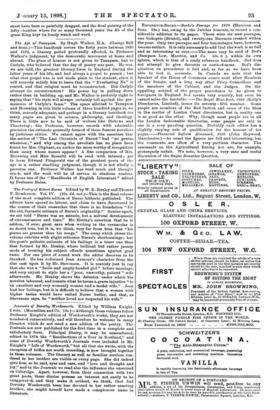REFERENCE-Boons.—Burke's Peerage for 1899 (Harrison and Sons. 38s.) has, owing
to the Jubilee honours, to record a con- siderable addition to its pages. There were six new peerages, one bishopric (Bristol), and twenty-one Baronets created within the year. Only two peerages and four baronetages have, however, become extinct. It is only necessary to add that the work is as full and as interesting as ever.—The same my be said of Dod's (Sampson Low, Marston, and Co. 10s. & .), within its own sphere, which is that of a ready reference handbook. Dod does not attempt to give descents or coats-of-arms. Dod's dis- quisition on precedence is full and, as far as we have been able to test it, accurate. In Canada we note that the Speaker of the House of Commons comes next after Members of the Senate, and a long way after Privy Councillors and the members of the Cabinet, and the Judges. On the appalling subject of the proper precedence to be given to foreigners in England Ddd speaks very sensibly, but even he cannot solve the insoluble.—The Royal Blue-Book, 1893 (Kelly's Directories, Limited), issues its seventy - fifth number. Some people are members of the Red faction and some of the Blue in the matter of London Court directories, but in reality one is as good as the other. Why, though most people are in all the London fashionable directories, some people are only in one is a very puzzling question. Probably each editor haa a slightly varying rule of qualification for the houour of his pages.—Financial Reform Atmanack, 1899 (John Heywood, Manchester.)—As usual the figures are full and interesting, but the comments are often of a very partisan character. The comments on the Agricultural Rating Act are, for example, grotesquely unfair. We note, however, a very sane and useful discussion of the Sugar Bounties Question.


































 Previous page
Previous page